Welcome to DU!
The truly grassroots left-of-center political community where regular people, not algorithms, drive the discussions and set the standards.
Join the community:
Create a free account
Support DU (and get rid of ads!):
Become a Star Member
Latest Breaking News
General Discussion
The DU Lounge
All Forums
Issue Forums
Culture Forums
Alliance Forums
Region Forums
Support Forums
Help & Search
Celerity
Celerity's Journal
Celerity's Journal
April 15, 2020
https://www.nytimes.com/2020/04/14/opinion/coronavirus-reopen-economy.html

Trying to predict Trump administration actions really is like Kremlinology, updated for the age of social media. There’s clearly no formal policy process; Donald Trump acts on impulse and intuition, often shaped either by whomever he last met or what he last saw on Fox News, making no use of the vast expertise he could call on if he were willing to listen. Those of us on the outside, and from all accounts, even many people within the administration try to infer what’s coming next from tweets and statements by people presumed to be in favor at the moment.
So what does Trumplinology suggest right now? That Trump really, really wants to end the economy’s lockdown very soon. Early Monday Trump tweeted out an assertion that he has the power to overrule state governors who have imposed lockdown orders — which suggests that we may have a constitutional crisis brewing, because as far as anybody knows he has no such power. Meanwhile, in an interview with The New York Times, Peter Navarro, Trump’s trade czar, argued that a weak economy might kill more people than the virus.
The thing is, as far as I can tell epidemiologists are united in the belief that it’s far too soon to be considering any relaxation of social distancing. The lockdowns across America do seem to have flattened the curve, allowing us to — just — avoid completely overwhelming the health care system. New cases may have peaked. But you don’t want to let up until you’re in a position to do so without giving the pandemic a second wave. And we’re nowhere close to that point. So where is this coming from? I’ve seen some people portray it as a conflict between epidemiologists and economists, but that’s all wrong. Serious economists know what they don’t know — they recognize and respect experts from other disciplines. A survey of economists found almost unanimous support for “tolerating a very large contraction in economic activity until the spread of infections has dropped significantly.”
No, this push to reopen is coming not from economists but from cranks and cronies. That is, it’s coming on one side from people who may describe themselves as economists but whom the professionals consider cranks — people like Navarro or Stephen Moore, who Trump tried unsuccessfully to appoint to the Federal Reserve Board. And on the other, it’s coming from business types with close ties to Trump who suffer from billionaire’s disease — the tendency to assume that just because you’re rich you’re also smarter than anyone else, even in areas like epidemiology (or, dare I say it, macroeconomics) that require a great deal of technical expertise.
snip
https://twitter.com/damianpaletta/status/1249798017441566720
https://twitter.com/dsh_OH/status/1249804705041170438
Paul Krugman: On cronies, cranks and the coronavirus.
Economists Aren’t the Ones Pushing to Reopen the Economyhttps://www.nytimes.com/2020/04/14/opinion/coronavirus-reopen-economy.html

Trying to predict Trump administration actions really is like Kremlinology, updated for the age of social media. There’s clearly no formal policy process; Donald Trump acts on impulse and intuition, often shaped either by whomever he last met or what he last saw on Fox News, making no use of the vast expertise he could call on if he were willing to listen. Those of us on the outside, and from all accounts, even many people within the administration try to infer what’s coming next from tweets and statements by people presumed to be in favor at the moment.
So what does Trumplinology suggest right now? That Trump really, really wants to end the economy’s lockdown very soon. Early Monday Trump tweeted out an assertion that he has the power to overrule state governors who have imposed lockdown orders — which suggests that we may have a constitutional crisis brewing, because as far as anybody knows he has no such power. Meanwhile, in an interview with The New York Times, Peter Navarro, Trump’s trade czar, argued that a weak economy might kill more people than the virus.
The thing is, as far as I can tell epidemiologists are united in the belief that it’s far too soon to be considering any relaxation of social distancing. The lockdowns across America do seem to have flattened the curve, allowing us to — just — avoid completely overwhelming the health care system. New cases may have peaked. But you don’t want to let up until you’re in a position to do so without giving the pandemic a second wave. And we’re nowhere close to that point. So where is this coming from? I’ve seen some people portray it as a conflict between epidemiologists and economists, but that’s all wrong. Serious economists know what they don’t know — they recognize and respect experts from other disciplines. A survey of economists found almost unanimous support for “tolerating a very large contraction in economic activity until the spread of infections has dropped significantly.”
No, this push to reopen is coming not from economists but from cranks and cronies. That is, it’s coming on one side from people who may describe themselves as economists but whom the professionals consider cranks — people like Navarro or Stephen Moore, who Trump tried unsuccessfully to appoint to the Federal Reserve Board. And on the other, it’s coming from business types with close ties to Trump who suffer from billionaire’s disease — the tendency to assume that just because you’re rich you’re also smarter than anyone else, even in areas like epidemiology (or, dare I say it, macroeconomics) that require a great deal of technical expertise.
snip
https://twitter.com/damianpaletta/status/1249798017441566720
https://twitter.com/dsh_OH/status/1249804705041170438
April 14, 2020
https://www.theatlantic.com/health/archive/2020/04/how-coronavirus-will-change-young-peoples-lives/609862/
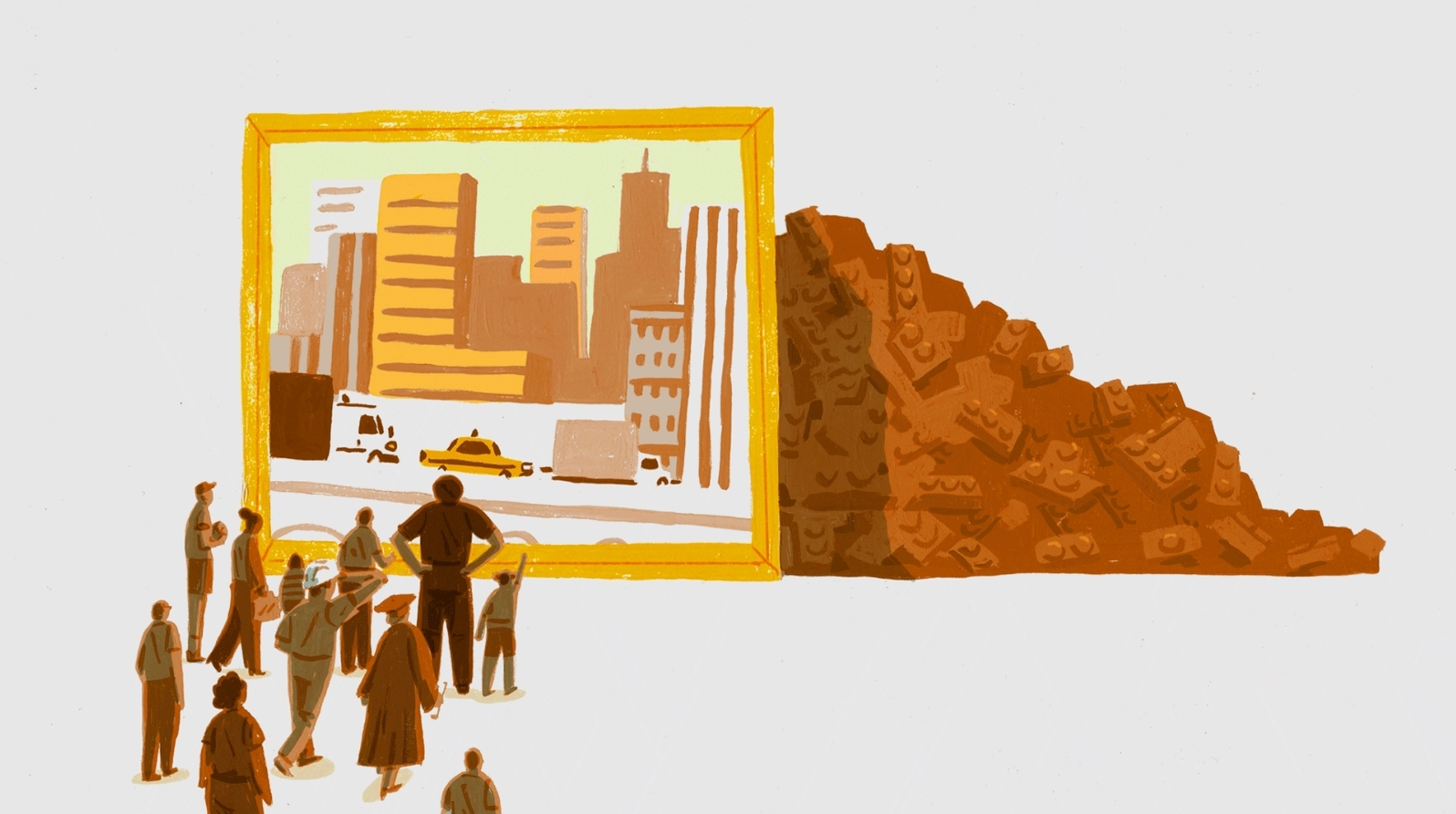
When Ananay Arora looks off his balcony, he doesn’t see much these days. From his high-rise apartment, which he shared with three roommates before one of them moved back to Taiwan a few weeks ago, he has a view of Arizona State University’s campus, where Arora is currently a sophomore majoring in computer science. It’s usually full of life, but like most colleges across the country, ASU canceled in-person classes in mid-March. “Everyone’s gone home. Nothing is going on,” he told me. “It’s kind of depressing.”
Like a lot of young people waiting out the coronavirus pandemic, Arora is contemplating his future, which includes a prestigious internship at Apple meant to begin in May. That’s why he stayed in his off-campus apartment instead of heading back to live with his parents in India. “If my internship happens and there’s a travel ban, I wouldn’t be able to get back,” he said. It’s not just a summer job: In the tech industry, being a good intern is by far the best way to get a coveted job offer after graduation. “Getting an [internship] interview is hard,” Arora explained. “If my internship gets completely canceled, I don’t know if any company is going to interview me again.”
In the face of enormous uncertainty, Arora and his classmates Kaan Aksoy and Devyash Lodha created ismyinternshipcancelled.com, which lets students submit what they know about various companies’ plans and keep track of which ones are still planning to bring on new people, and if they are, whether those internships can be done remotely. Arora says that in the few days since he and his friends launched the site, which currently lists more than 300 companies, thousands of people have visited. For healthy young people like Arora—who seem much less likely to have severe complications with COVID-19 than their elderly counterparts—living through a months-long quarantine and the deep economic recession likely to come after it will have consequences all its own, most of which, for the moment, are unknowable.
It’s hard to imagine the future of this cohort in any detail, beyond the fact that their lives will be, in at least some ways, profoundly different from what they might have been. While writing about how the pandemic might eventually end, my colleague Ed Yong posited that babies born in the post-coronavirus era, who will never know life before whatever enduring changes lie ahead, might be called Generation C. But Generation C includes more than just babies. Kids, college students, and those in their first post-graduation jobs are also uniquely vulnerable to short-term catastrophe. Recent history tells us that the people in this group could see their careers derailed, finances shattered, and social lives upended. Predicting the future is a fool’s errand even when the world isn’t weathering what looks to be an epoch-defining calamity, but in the disasters of the past lie clues that can begin to answer a question vital to the lives of millions of Americans: What will become of Generation C?
snip
Generation C Has Nowhere to Turn
Recent history suggests young people could see their careers derailed, finances shattered, and social lives upended.https://www.theatlantic.com/health/archive/2020/04/how-coronavirus-will-change-young-peoples-lives/609862/

When Ananay Arora looks off his balcony, he doesn’t see much these days. From his high-rise apartment, which he shared with three roommates before one of them moved back to Taiwan a few weeks ago, he has a view of Arizona State University’s campus, where Arora is currently a sophomore majoring in computer science. It’s usually full of life, but like most colleges across the country, ASU canceled in-person classes in mid-March. “Everyone’s gone home. Nothing is going on,” he told me. “It’s kind of depressing.”
Like a lot of young people waiting out the coronavirus pandemic, Arora is contemplating his future, which includes a prestigious internship at Apple meant to begin in May. That’s why he stayed in his off-campus apartment instead of heading back to live with his parents in India. “If my internship happens and there’s a travel ban, I wouldn’t be able to get back,” he said. It’s not just a summer job: In the tech industry, being a good intern is by far the best way to get a coveted job offer after graduation. “Getting an [internship] interview is hard,” Arora explained. “If my internship gets completely canceled, I don’t know if any company is going to interview me again.”
In the face of enormous uncertainty, Arora and his classmates Kaan Aksoy and Devyash Lodha created ismyinternshipcancelled.com, which lets students submit what they know about various companies’ plans and keep track of which ones are still planning to bring on new people, and if they are, whether those internships can be done remotely. Arora says that in the few days since he and his friends launched the site, which currently lists more than 300 companies, thousands of people have visited. For healthy young people like Arora—who seem much less likely to have severe complications with COVID-19 than their elderly counterparts—living through a months-long quarantine and the deep economic recession likely to come after it will have consequences all its own, most of which, for the moment, are unknowable.
It’s hard to imagine the future of this cohort in any detail, beyond the fact that their lives will be, in at least some ways, profoundly different from what they might have been. While writing about how the pandemic might eventually end, my colleague Ed Yong posited that babies born in the post-coronavirus era, who will never know life before whatever enduring changes lie ahead, might be called Generation C. But Generation C includes more than just babies. Kids, college students, and those in their first post-graduation jobs are also uniquely vulnerable to short-term catastrophe. Recent history tells us that the people in this group could see their careers derailed, finances shattered, and social lives upended. Predicting the future is a fool’s errand even when the world isn’t weathering what looks to be an epoch-defining calamity, but in the disasters of the past lie clues that can begin to answer a question vital to the lives of millions of Americans: What will become of Generation C?
snip
April 14, 2020
https://www.theatlantic.com/ideas/archive/2020/04/millennials-are-new-lost-generation/609832/
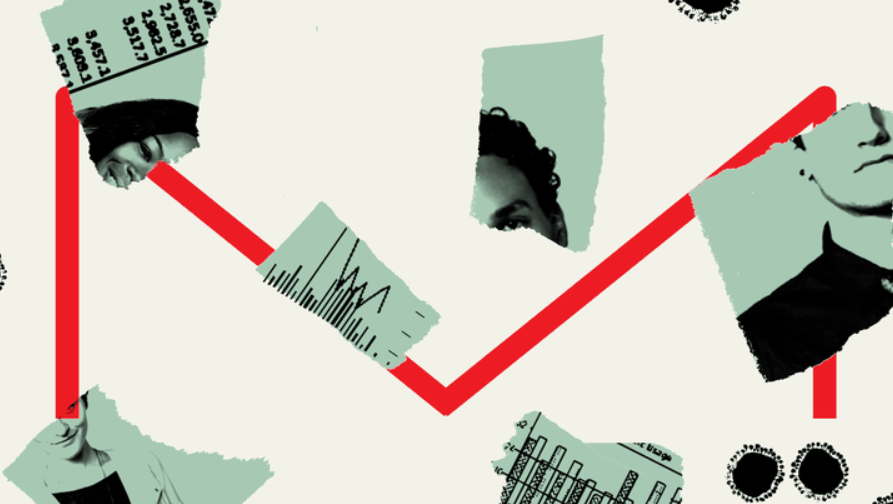
Hello, lost generation.
The Millennials entered the workforce during the worst downturn since the Great Depression. Saddled with debt, unable to accumulate wealth, and stuck in low-benefit, dead-end jobs, they never gained the financial security that their parents, grandparents, or even older siblings enjoyed. They are now entering their peak earning years in the midst of an economic cataclysm more severe than the Great Recession, near guaranteeing that they will be the first generation in modern American history to end up poorer than their parents.
It is too soon to know how the unfurling business-failure and unemployment crisis caused by this novel public-health crisis is hitting different age groups, or how much income and wealth each generation is losing; it is far too soon to know how different groups will rebound. But we do know that Millennials are vulnerable. They have smaller savings accounts than prior generations. They have less money invested. They own fewer houses to refinance or rent out or sell. They make less money, and are less likely to have benefits like paid sick leave. They have more than half a trillion dollars of student-loan debt to keep paying off, as well as hefty rent and child-care payments that keep coming due.
Compounding their troubles, Millennials are, for now, disproportionate holders of the kind of positions disappearing the fastest: This is a jobs crisis of the young, the diverse, and the contingent, meaning disproportionately of the Millennials. They make up a majority of bartenders, half of restaurant workers, and a large share of retail workers. They are also heavily dependent on gig and contract work, which is evaporating as the consumer economy grinds to a halt. It’s a cruel economic version of that old Catskill resort joke: These are terrible jobs, and now all the young people holding them are getting fired. What little data exist point to a financial tsunami for younger workers. In a new report, Data for Progress found that a staggering 52 percent of people under the age of 45 have lost a job, been put on leave, or had their hours reduced due to the pandemic, compared with 26 percent of people over the age of 45. Nearly half said that the cash payments the federal government is sending to lower- and middle-income individuals would cover just a week or two of expenses, compared with a third of older adults. This means skipped meals, scuppered start-ups, and lost homes. It means Great Depression–type precarity for prime-age workers in the richest country on earth.
Recessions are not good for anyone, from infants to the elderly. Nor are pandemics. Americans born during this calamity will be more likely to have low birth weights and to be in poor health generally, with lifelong effects. Children will not just endure this trauma—manifested in lost months of schooling, skipped meals, housing volatility, and increased abuse—but will carry it with them. Zoomers graduating into the recession will die sooner because of it, suffering increased incidence of heart disease, lung cancer, liver disease, and drug overdoses in the coming decades; they will also earn less over the course of their lives. The elderly are likely to be the most economically insulated group but are facing the most terrifying health consequences. Among adults the news isn’t good, either. And particularly not for those youngish-but-no-longer-young adults who came into this crisis already vulnerable, already fragile, already over-indebted and underpaid. The Millennials were left with scars during the Great Recession that never quite healed, and inherited an economy structured to manufacture precarity for the young and the poor and black and brown, and to perpetuate wealth for the old and the rich and white.
snip
Millennials Don't Stand a Chance
They’re facing a second once-in-a-lifetime downturn at a crucial moment.https://www.theatlantic.com/ideas/archive/2020/04/millennials-are-new-lost-generation/609832/

Hello, lost generation.
The Millennials entered the workforce during the worst downturn since the Great Depression. Saddled with debt, unable to accumulate wealth, and stuck in low-benefit, dead-end jobs, they never gained the financial security that their parents, grandparents, or even older siblings enjoyed. They are now entering their peak earning years in the midst of an economic cataclysm more severe than the Great Recession, near guaranteeing that they will be the first generation in modern American history to end up poorer than their parents.
It is too soon to know how the unfurling business-failure and unemployment crisis caused by this novel public-health crisis is hitting different age groups, or how much income and wealth each generation is losing; it is far too soon to know how different groups will rebound. But we do know that Millennials are vulnerable. They have smaller savings accounts than prior generations. They have less money invested. They own fewer houses to refinance or rent out or sell. They make less money, and are less likely to have benefits like paid sick leave. They have more than half a trillion dollars of student-loan debt to keep paying off, as well as hefty rent and child-care payments that keep coming due.
Compounding their troubles, Millennials are, for now, disproportionate holders of the kind of positions disappearing the fastest: This is a jobs crisis of the young, the diverse, and the contingent, meaning disproportionately of the Millennials. They make up a majority of bartenders, half of restaurant workers, and a large share of retail workers. They are also heavily dependent on gig and contract work, which is evaporating as the consumer economy grinds to a halt. It’s a cruel economic version of that old Catskill resort joke: These are terrible jobs, and now all the young people holding them are getting fired. What little data exist point to a financial tsunami for younger workers. In a new report, Data for Progress found that a staggering 52 percent of people under the age of 45 have lost a job, been put on leave, or had their hours reduced due to the pandemic, compared with 26 percent of people over the age of 45. Nearly half said that the cash payments the federal government is sending to lower- and middle-income individuals would cover just a week or two of expenses, compared with a third of older adults. This means skipped meals, scuppered start-ups, and lost homes. It means Great Depression–type precarity for prime-age workers in the richest country on earth.
Recessions are not good for anyone, from infants to the elderly. Nor are pandemics. Americans born during this calamity will be more likely to have low birth weights and to be in poor health generally, with lifelong effects. Children will not just endure this trauma—manifested in lost months of schooling, skipped meals, housing volatility, and increased abuse—but will carry it with them. Zoomers graduating into the recession will die sooner because of it, suffering increased incidence of heart disease, lung cancer, liver disease, and drug overdoses in the coming decades; they will also earn less over the course of their lives. The elderly are likely to be the most economically insulated group but are facing the most terrifying health consequences. Among adults the news isn’t good, either. And particularly not for those youngish-but-no-longer-young adults who came into this crisis already vulnerable, already fragile, already over-indebted and underpaid. The Millennials were left with scars during the Great Recession that never quite healed, and inherited an economy structured to manufacture precarity for the young and the poor and black and brown, and to perpetuate wealth for the old and the rich and white.
snip
April 14, 2020

Hong Kong (CNN)China has imposed restrictions on the publication of academic research on the origins of the novel coronavirus, according to a central government directive and http://www.it.fudan.edu.cn/Data/View/3657" target="_blank">online notices published by two Chinese universities, that have since been removed from the web. Under the new policy, all academic papers on Covid-19 will be subject to extra vetting before being submitted for publication. Studies on the origin of the virus will receive extra scrutiny and must be approved by central government officials, according to the now-deleted posts.
A medical expert in Hong Kong who collaborated with mainland researchers to publish a clinical analysis of Covid-19 cases in an international medical journal said his work did not undergo such vetting in February.
The increased scrutiny appears to be the latest effort by the Chinese government to control the narrative on the origins of the coronavirus pandemic, which has claimed more than 100,000 lives and sickened 1.7 million people worldwide since it first broke out in the Chinese city of Wuhan in December.
Since late January, Chinese researchers have published a series of Covid-19 studies in influential international medical journals. Some findings about early coronavirus cases -- such as when human-to-human transition first appeared -- have raised questions over the official government account of the outbreak and sparked controversy on Chinese social media.
And now, Chinese authorities appear to be tightening their grip on the publication of Covid-19 research.
A Chinese researcher who spoke on condition of anonymity due to fear of retaliation said the move was a worrying development that would likely obstruct important scientific research. "I think it is a coordinated effort from (the) Chinese government to control (the) narrative, and paint it as if the outbreak did not originate in China," the researcher told CNN. "And I don't think they will really tolerate any objective study to investigate the origination of this disease."
snip
here are snapshots of an early, highly suppressed (the Chinese government had it pulled from Nature, one of the world's most influential scientific journals) Chinese study that said the virus probably came from the Wuhan Level 4 Biolab


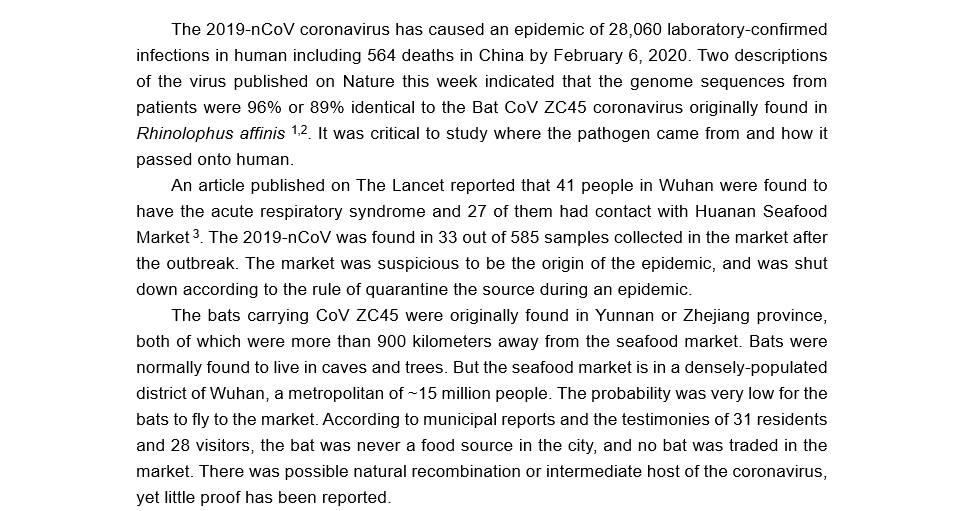
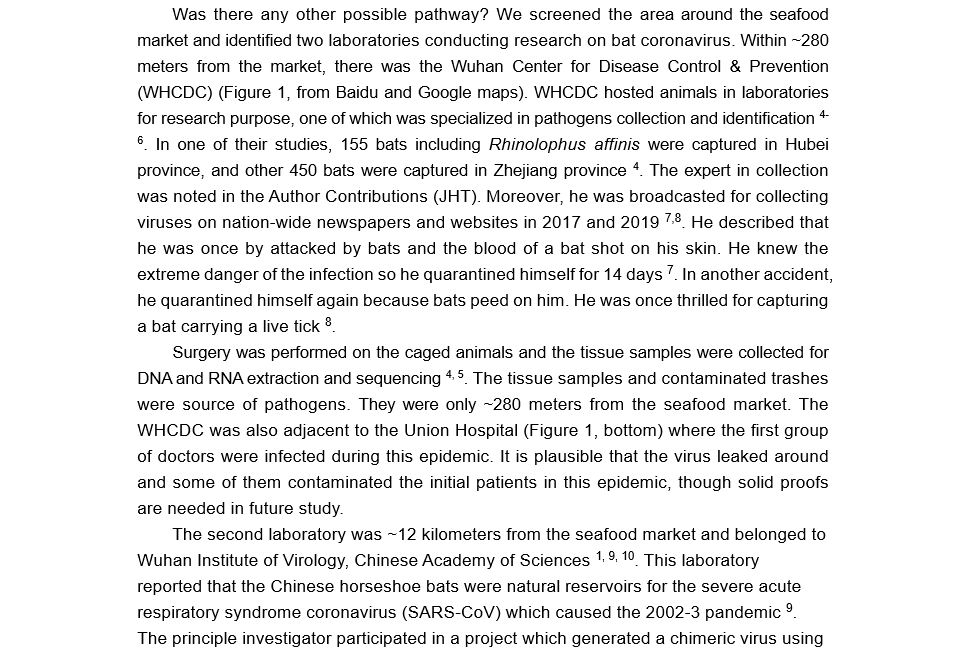
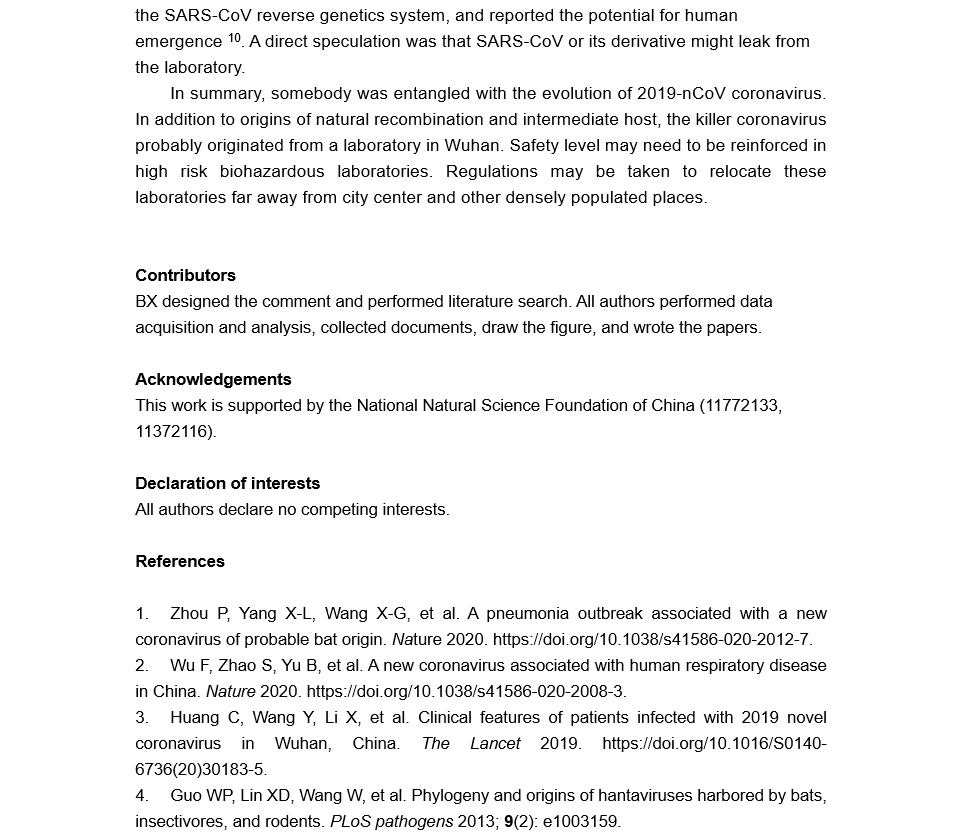

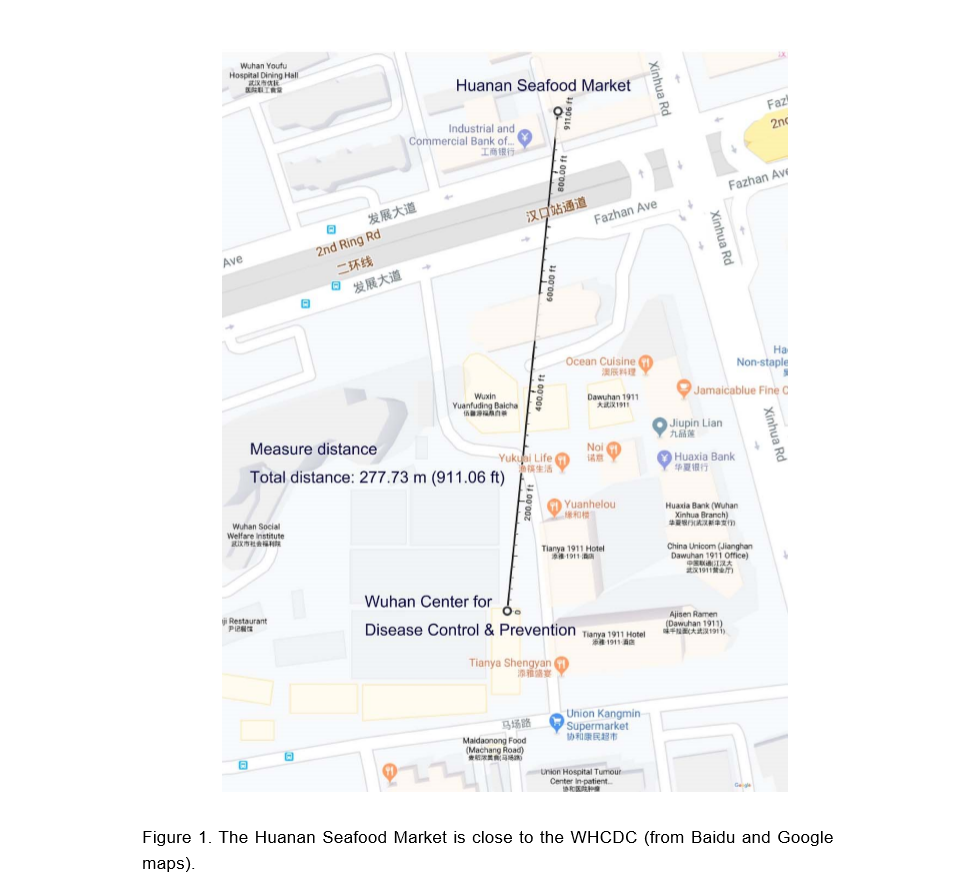
Beijing tightens grip over coronavirus research, amid US-China row on virus origin
https://edition.cnn.com/2020/04/12/asia/china-coronavirus-research-restrictions-intl-hnk/index.html
Hong Kong (CNN)China has imposed restrictions on the publication of academic research on the origins of the novel coronavirus, according to a central government directive and http://www.it.fudan.edu.cn/Data/View/3657" target="_blank">online notices published by two Chinese universities, that have since been removed from the web. Under the new policy, all academic papers on Covid-19 will be subject to extra vetting before being submitted for publication. Studies on the origin of the virus will receive extra scrutiny and must be approved by central government officials, according to the now-deleted posts.
A medical expert in Hong Kong who collaborated with mainland researchers to publish a clinical analysis of Covid-19 cases in an international medical journal said his work did not undergo such vetting in February.
The increased scrutiny appears to be the latest effort by the Chinese government to control the narrative on the origins of the coronavirus pandemic, which has claimed more than 100,000 lives and sickened 1.7 million people worldwide since it first broke out in the Chinese city of Wuhan in December.
Since late January, Chinese researchers have published a series of Covid-19 studies in influential international medical journals. Some findings about early coronavirus cases -- such as when human-to-human transition first appeared -- have raised questions over the official government account of the outbreak and sparked controversy on Chinese social media.
And now, Chinese authorities appear to be tightening their grip on the publication of Covid-19 research.
A Chinese researcher who spoke on condition of anonymity due to fear of retaliation said the move was a worrying development that would likely obstruct important scientific research. "I think it is a coordinated effort from (the) Chinese government to control (the) narrative, and paint it as if the outbreak did not originate in China," the researcher told CNN. "And I don't think they will really tolerate any objective study to investigate the origination of this disease."
snip
here are snapshots of an early, highly suppressed (the Chinese government had it pulled from Nature, one of the world's most influential scientific journals) Chinese study that said the virus probably came from the Wuhan Level 4 Biolab







April 14, 2020
https://thebanter.substack.com/p/trump-supporters-are-directly-responsible

It’s official, the United States now has the highest death toll from Coronavirus of any country on earth. That includes China, were the virus originated from, and Italy, the previously hardest hit nation that failed spectacularly to control the outbreak. As per NBC News: The United States now has the lead with the most deaths from the coronavirus outbreak of any nation worldwide with nearly 22,000 lives lost. Meanwhile in Italy, previously the worst-hit country, officials on Monday were considering loosening lockdown measures after the lowest number of deaths in a single day since March 19. This happened because Donald Trump did not listen to the urgent pleas of government scientists and disease experts and get a head start on the outbreak that was wreaking havoc on Asia and Europe. This also happened because enough Americans voted for a madman in 2016, apparently believing a reality TV show host and fake billionaire could actually run the country. He can’t, and now Americans are paying the ultimate price.
From bad to terrifyingly horrible
On Sunday, the New York Times broke a truly devastating story on Trump’s astonishing stonewalling of the experts pleading with him to take the COVID-19 pandemic seriously. The timeline laid out by the Times reporters is beyond damning — it is incriminating: The National Security Council office responsible for tracking pandemics received intelligence reports in early January predicting the spread of the virus to the United States, and within weeks was raising options like keeping Americans home from work and shutting down cities the size of Chicago. Mr. Trump would avoid such steps until March. Despite Mr. Trump’s denial weeks later, he was told at the time about a Jan. 29 memo produced by his trade adviser, Peter Navarro, laying out in striking detail the potential risks of a coronavirus pandemic: as many as half a million deaths and trillions of dollars in economic losses.
The health and human services secretary, Alex M. Azar II, directly warned Mr. Trump of the possibility of a pandemic during a call on Jan. 30, the second warning he delivered to the president about the virus in two weeks. The president, who was on Air Force One while traveling for appearances in the Midwest, responded that Mr. Azar was being alarmist. Mr. Azar publicly announced in February that the government was establishing a “surveillance” system in five American cities to measure the spread of the virus and enable experts to project the next hot spots. It was delayed for weeks. The slow start of that plan, on top of the well-documented failures to develop the nation’s testing capacity, left administration officials with almost no insight into how rapidly the virus was spreading. “We were flying the plane with no instruments,” one official said.
By the third week in February, the administration’s top public health experts concluded they should recommend to Mr. Trump a new approach that would include warning the American people of the risks and urging steps like social distancing and staying home from work. But the White House focused instead on messaging and crucial additional weeks went by before their views were reluctantly accepted by the president — time when the virus spread largely unimpeded. These crucial weeks that went by are being paid for by Americans choking to death on ventilators all around the country. Trump had an opportunity to make America an example of how to deal effectively with an epidemic. Instead, he has turned the most powerful country on earth into a global laughing stock.
America the joke
Other countries are watching in sheer disbelief at the calamity in America, amazed by the incompetence, carelessness, and extraordinary indifference to human suffering..................................... (much more at the link)
snip
https://gisanddata.maps.arcgis.com/apps/opsdashboard/index.html#/bda7594740fd40299423467b48e9ecf6
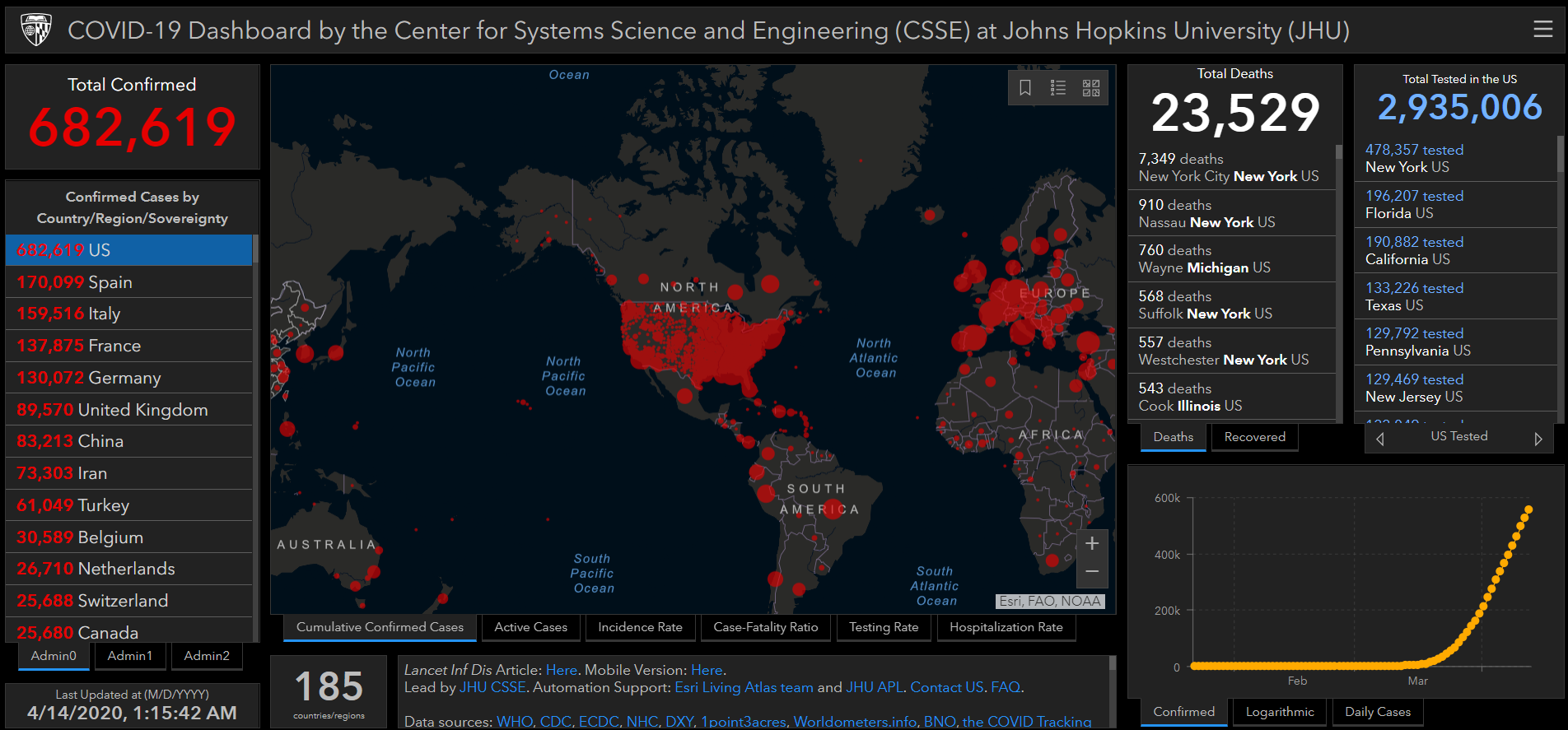
Trump Supporters Are Directly Responsible For The Enormous Coronavirus Death Toll
America now leads the world in Coronavirus deaths, and all thanks to Trump and the supporters who voted for him.https://thebanter.substack.com/p/trump-supporters-are-directly-responsible

It’s official, the United States now has the highest death toll from Coronavirus of any country on earth. That includes China, were the virus originated from, and Italy, the previously hardest hit nation that failed spectacularly to control the outbreak. As per NBC News: The United States now has the lead with the most deaths from the coronavirus outbreak of any nation worldwide with nearly 22,000 lives lost. Meanwhile in Italy, previously the worst-hit country, officials on Monday were considering loosening lockdown measures after the lowest number of deaths in a single day since March 19. This happened because Donald Trump did not listen to the urgent pleas of government scientists and disease experts and get a head start on the outbreak that was wreaking havoc on Asia and Europe. This also happened because enough Americans voted for a madman in 2016, apparently believing a reality TV show host and fake billionaire could actually run the country. He can’t, and now Americans are paying the ultimate price.
From bad to terrifyingly horrible
On Sunday, the New York Times broke a truly devastating story on Trump’s astonishing stonewalling of the experts pleading with him to take the COVID-19 pandemic seriously. The timeline laid out by the Times reporters is beyond damning — it is incriminating: The National Security Council office responsible for tracking pandemics received intelligence reports in early January predicting the spread of the virus to the United States, and within weeks was raising options like keeping Americans home from work and shutting down cities the size of Chicago. Mr. Trump would avoid such steps until March. Despite Mr. Trump’s denial weeks later, he was told at the time about a Jan. 29 memo produced by his trade adviser, Peter Navarro, laying out in striking detail the potential risks of a coronavirus pandemic: as many as half a million deaths and trillions of dollars in economic losses.
The health and human services secretary, Alex M. Azar II, directly warned Mr. Trump of the possibility of a pandemic during a call on Jan. 30, the second warning he delivered to the president about the virus in two weeks. The president, who was on Air Force One while traveling for appearances in the Midwest, responded that Mr. Azar was being alarmist. Mr. Azar publicly announced in February that the government was establishing a “surveillance” system in five American cities to measure the spread of the virus and enable experts to project the next hot spots. It was delayed for weeks. The slow start of that plan, on top of the well-documented failures to develop the nation’s testing capacity, left administration officials with almost no insight into how rapidly the virus was spreading. “We were flying the plane with no instruments,” one official said.
By the third week in February, the administration’s top public health experts concluded they should recommend to Mr. Trump a new approach that would include warning the American people of the risks and urging steps like social distancing and staying home from work. But the White House focused instead on messaging and crucial additional weeks went by before their views were reluctantly accepted by the president — time when the virus spread largely unimpeded. These crucial weeks that went by are being paid for by Americans choking to death on ventilators all around the country. Trump had an opportunity to make America an example of how to deal effectively with an epidemic. Instead, he has turned the most powerful country on earth into a global laughing stock.
America the joke
Other countries are watching in sheer disbelief at the calamity in America, amazed by the incompetence, carelessness, and extraordinary indifference to human suffering..................................... (much more at the link)
snip
https://gisanddata.maps.arcgis.com/apps/opsdashboard/index.html#/bda7594740fd40299423467b48e9ecf6

April 13, 2020
blah, we (Sweden) just past the US-equivalent of 30,000 deaths, now at 30,195 equivalent
and generally a shedload not reported from over the weekend will come flooding in by 1600 or 1700 our time. 351,351 cases reported, atm, US population adjusted.
Still no lockdowns. ![]()
https://c19.se/en
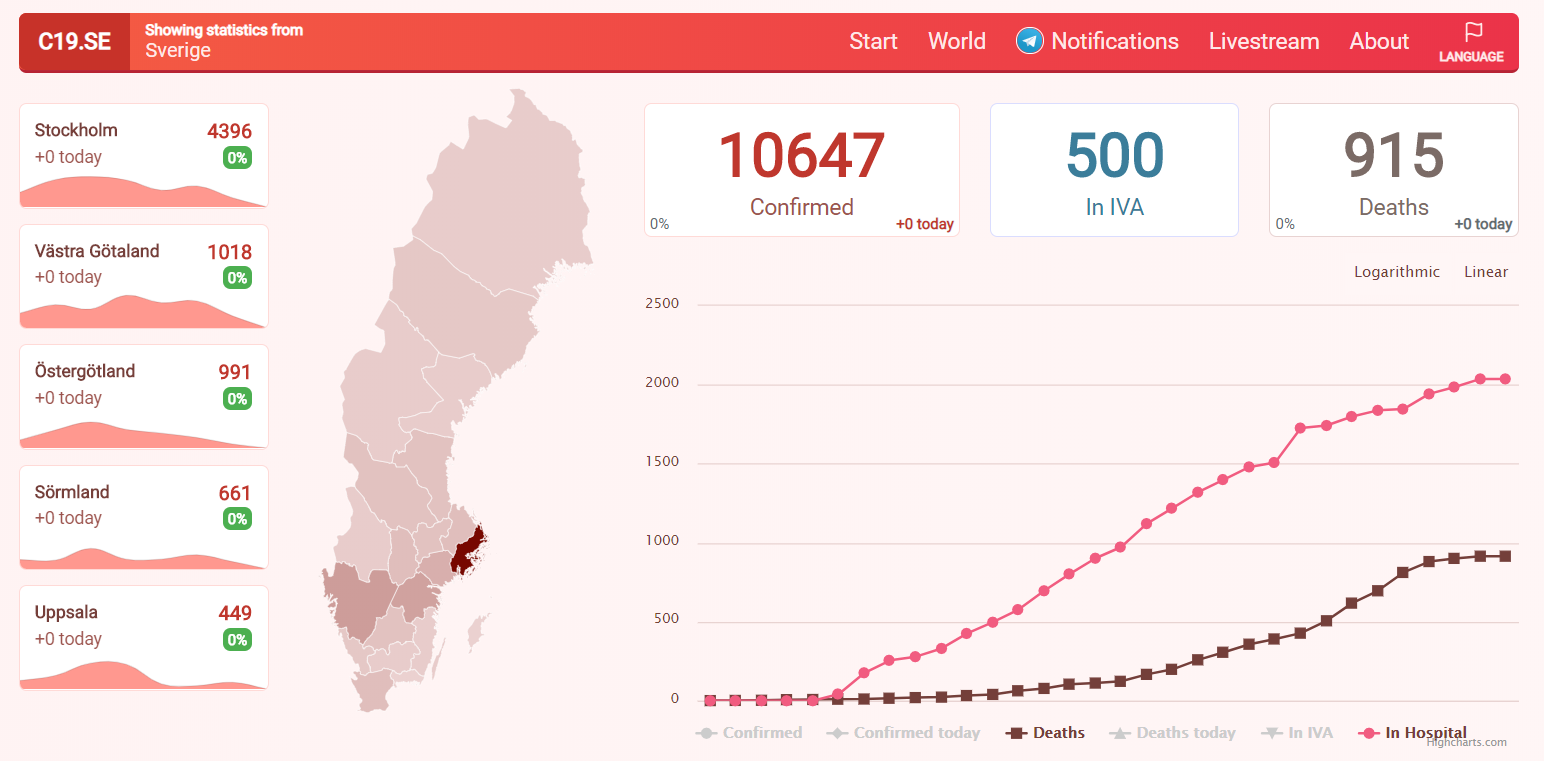
Easter weekend pics













April 13, 2020
https://twitter.com/matthewstoller/status/1249429867537534977
https://twitter.com/For2000years/status/1249472454327762945
If the Post Office had used 96% of its cash flow to buy back stock instead of deliver mail to rural
areas it would have been bailed out by the Fed in March.https://twitter.com/matthewstoller/status/1249429867537534977
https://twitter.com/For2000years/status/1249472454327762945
April 13, 2020
https://dailybruin.com/2020/04/10/stans-donuts-to-close-after-55-years-of-business-citing-covid-19/
The famous doughnut shop at the corner of Weyburn and Broxton avenues permanently closed in light of the impact of the coronavirus pandemic, according to a statement published by owner Stan Berman on the store’s website.
“It is with a sad heart that I inform you that I have made the decision to close my doors and (Thursday) will be the last day I will be making donuts,” Berman said. “Unfortunately COVID-19 made the decision happen sooner, but I hope that you will remember how our donuts made you smile for many years to come.”
Los Angeles Mayor Eric Garcetti ordered restaurants to close March 15 and Gov. Gavin Newsom mandated nonessential businesses to close statewide March 19 to slow the spread of the virus. Restaurants are still permitted to serve food to-go or offer delivery, but the pandemic and the government response has nevertheless constrained economic activity, putting many businesses in dire circumstances.
Berman opened Stan’s Donuts as The Corner Shoppe in 1965. Located in the heart of Westwood Village and right across from the historic Fox Theater, the shop has served over 75 doughnut varieties to generations of UCLA students, locals and tourists. Stan’s Donuts & Coffee, a shop inspired by Berman’s original, opened in Chicago in 2014 and has since expanded to multiple locations. Berman tried to expand Stan’s Donuts to other locations over the years but ultimately decided to only operate his Westwood shop.
snip
https://www.stansdoughnuts.com/
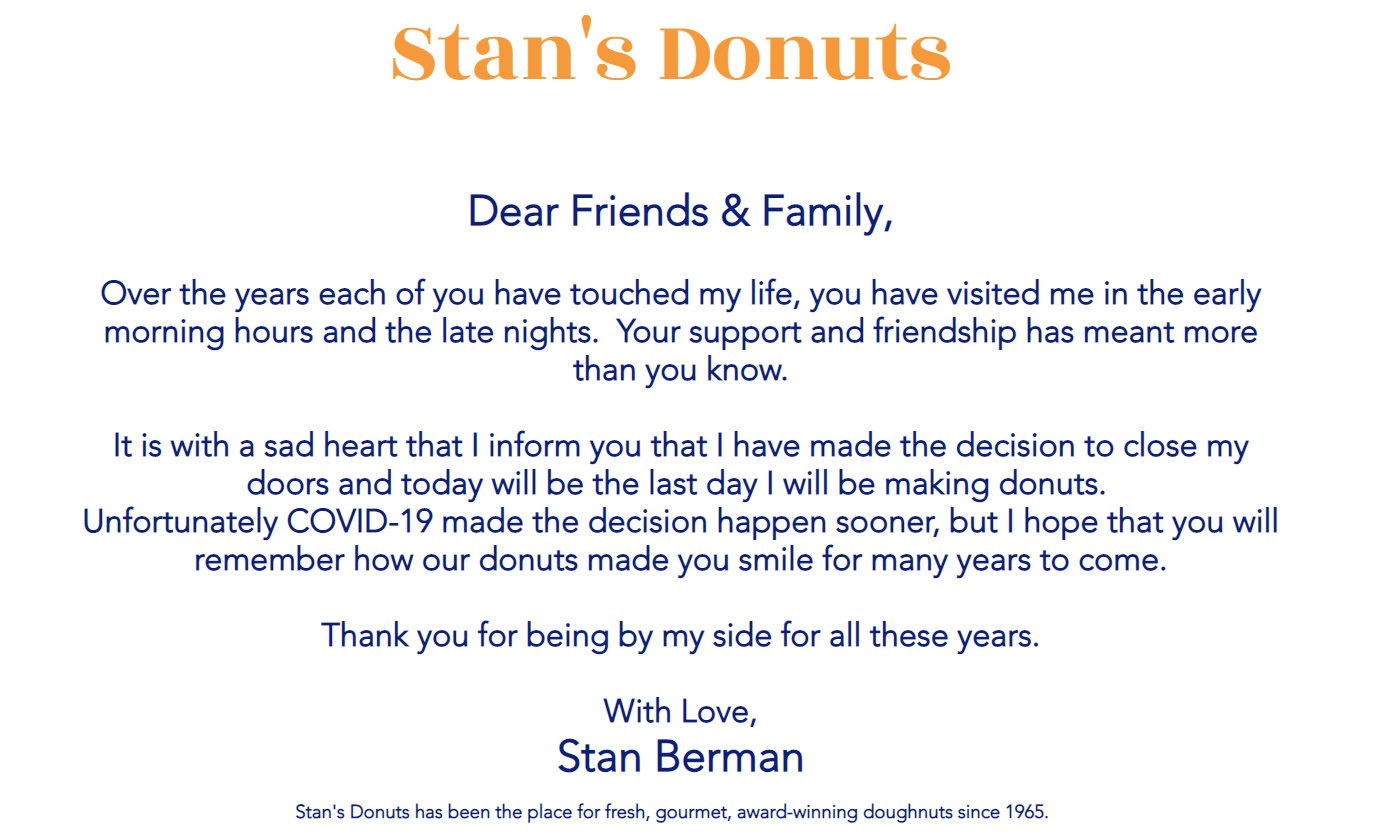
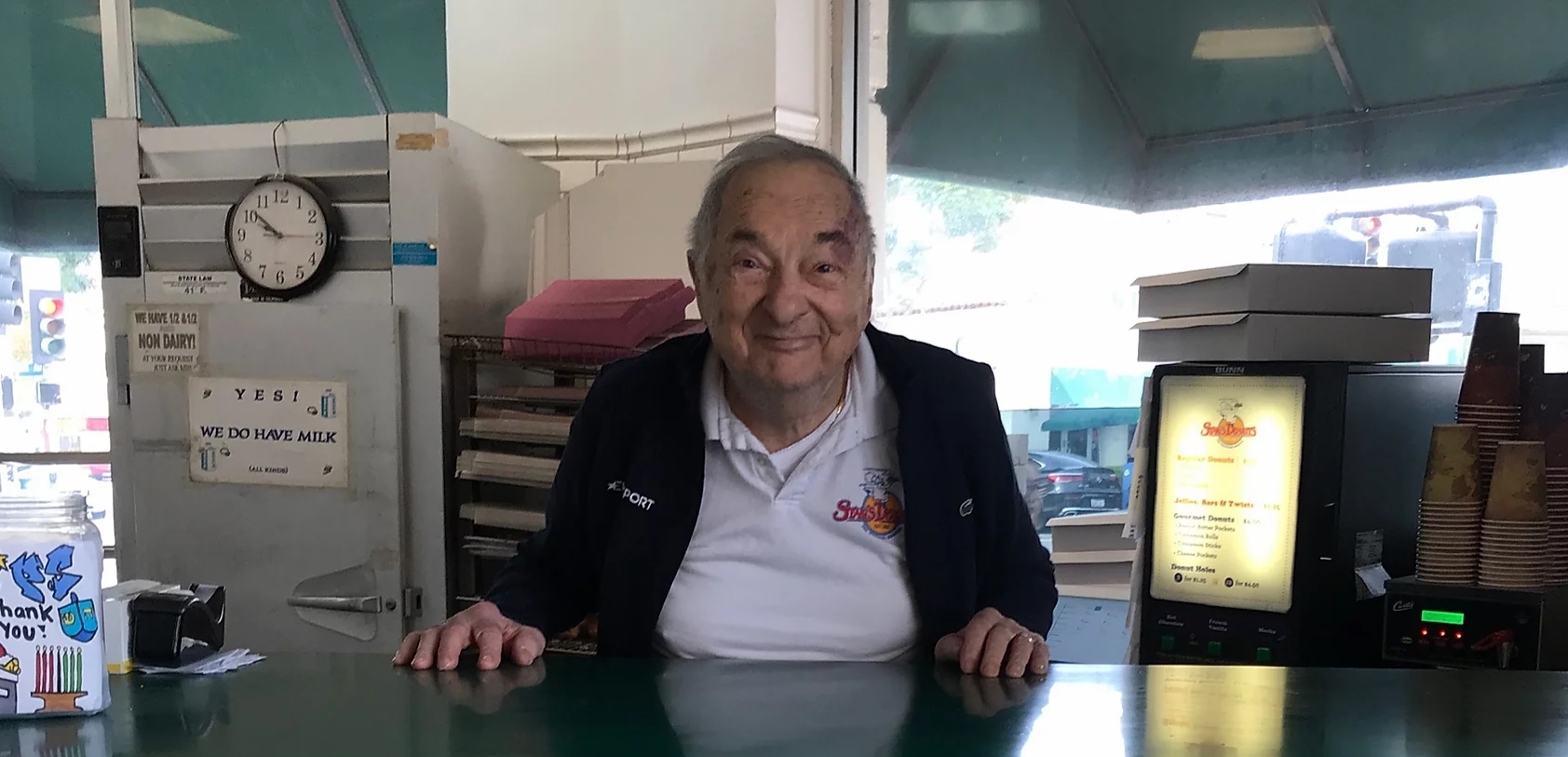

I used to get coffee and a peanut butter and jelly donut (soo jummi!) sometimes there whilst I attended UCLA
(soo jummi!) sometimes there whilst I attended UCLA
Enzo's pizza too, omg their white pizza was super good
Stan's Donuts to close after 55 years of business, citing COVID-19
Stan’s Donuts, a 55-year staple of Westwood Village, served its last doughnut Thursday.https://dailybruin.com/2020/04/10/stans-donuts-to-close-after-55-years-of-business-citing-covid-19/
The famous doughnut shop at the corner of Weyburn and Broxton avenues permanently closed in light of the impact of the coronavirus pandemic, according to a statement published by owner Stan Berman on the store’s website.
“It is with a sad heart that I inform you that I have made the decision to close my doors and (Thursday) will be the last day I will be making donuts,” Berman said. “Unfortunately COVID-19 made the decision happen sooner, but I hope that you will remember how our donuts made you smile for many years to come.”
Los Angeles Mayor Eric Garcetti ordered restaurants to close March 15 and Gov. Gavin Newsom mandated nonessential businesses to close statewide March 19 to slow the spread of the virus. Restaurants are still permitted to serve food to-go or offer delivery, but the pandemic and the government response has nevertheless constrained economic activity, putting many businesses in dire circumstances.
Berman opened Stan’s Donuts as The Corner Shoppe in 1965. Located in the heart of Westwood Village and right across from the historic Fox Theater, the shop has served over 75 doughnut varieties to generations of UCLA students, locals and tourists. Stan’s Donuts & Coffee, a shop inspired by Berman’s original, opened in Chicago in 2014 and has since expanded to multiple locations. Berman tried to expand Stan’s Donuts to other locations over the years but ultimately decided to only operate his Westwood shop.
snip
https://www.stansdoughnuts.com/


I used to get coffee and a peanut butter and jelly donut
Enzo's pizza too, omg their white pizza was super good
April 12, 2020
https://www.highsnobiety.com/p/covid-19-fashion-industry-impact/
The devastating impact of the virus has decimated the industry, leaving fashion businesses exposed or rudderless across the board. Previously planned strategies for 2020 have become redundant, as leaders try to control the fall-out from what is being described in some quarters as “the ultimate Black Swan event.” This impacts everyone, from media planners in Philadelphia to factory workers in Phnom Penh. “Though the duration and ultimate severity of the pandemic remains unknown, it is apparent that the fashion industry is just at the beginning of its struggle,” reads an ominous part of the introduction.
Store closures due to quarantine measures are already having disastrous consequences. If stores remain closed for two months, the report suggests that 80 percent of publicly listed fashion companies in Europe and North America will find themselves in financial distress. It doesn’t window dress what that might entail, stating: “Combined with the McKinsey Global Fashion Index (MGFI) analysis, which found that 56 percent of global fashion companies were not earning their cost of capital in 2018, we expect a large number of global fashion companies to go bankrupt in the next 12 to 18 months.”
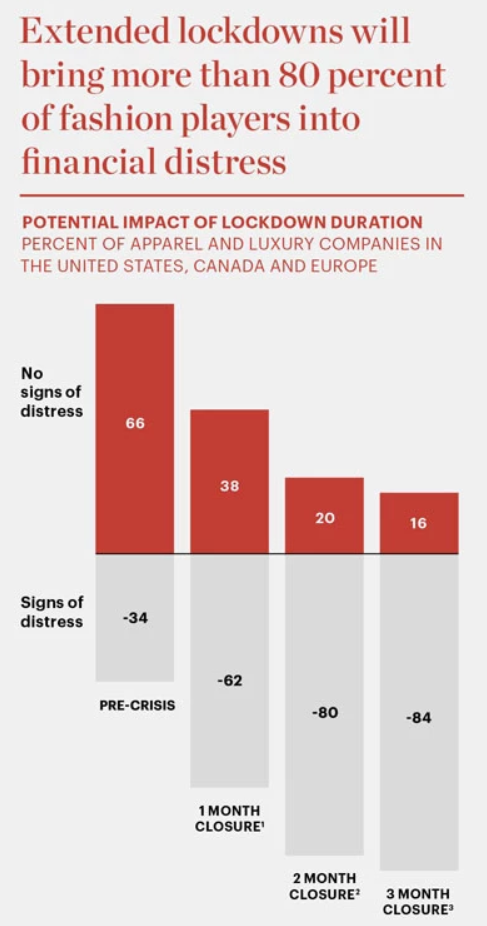
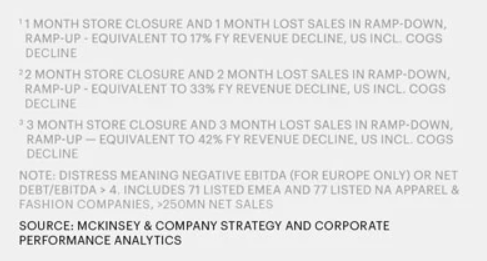
The report predicts that revenues for the global fashion industry (apparel and footwear sectors) will contract by up to 30 percent in 2020 year-on-year, while the personal luxury goods industry (luxury fashion, luxury accessories, luxury watches, luxury jewelry, and high-end beauty), will contract up to 40 percent. As backed up in a Stackline report yesterday, this can be attributed to the discretionary nature of fashion and the fact that wealthy consumers have stopped traveling and shopping.
It then goes on to explain how the interconnectedness of the industry is causing it to suffer. Staff layoffs and wage cuts have become a reality, just as closed stores mean orders have been canceled, leaving garment workers in the developing world out of work. “For workers in low-cost sourcing and fashion-manufacturing hubs, such as Bangladesh, Cambodia, Ethiopia, Honduras, and India, extended periods of unemployment will mean hunger and disease,” reads a particularly stark paragraph.
snip
Covid-19 Has Decimated the Fashion Industry & Could Spell the End for Hype Product
The Business of Fashion and McKinsey & Company have released a new update examining the effects of Covid-19 on the $2.5 trillion fashion industry. The findings, as one would expect, make for seriously grim reading, with millions of jobs put at risk.https://www.highsnobiety.com/p/covid-19-fashion-industry-impact/
The devastating impact of the virus has decimated the industry, leaving fashion businesses exposed or rudderless across the board. Previously planned strategies for 2020 have become redundant, as leaders try to control the fall-out from what is being described in some quarters as “the ultimate Black Swan event.” This impacts everyone, from media planners in Philadelphia to factory workers in Phnom Penh. “Though the duration and ultimate severity of the pandemic remains unknown, it is apparent that the fashion industry is just at the beginning of its struggle,” reads an ominous part of the introduction.
Store closures due to quarantine measures are already having disastrous consequences. If stores remain closed for two months, the report suggests that 80 percent of publicly listed fashion companies in Europe and North America will find themselves in financial distress. It doesn’t window dress what that might entail, stating: “Combined with the McKinsey Global Fashion Index (MGFI) analysis, which found that 56 percent of global fashion companies were not earning their cost of capital in 2018, we expect a large number of global fashion companies to go bankrupt in the next 12 to 18 months.”


The report predicts that revenues for the global fashion industry (apparel and footwear sectors) will contract by up to 30 percent in 2020 year-on-year, while the personal luxury goods industry (luxury fashion, luxury accessories, luxury watches, luxury jewelry, and high-end beauty), will contract up to 40 percent. As backed up in a Stackline report yesterday, this can be attributed to the discretionary nature of fashion and the fact that wealthy consumers have stopped traveling and shopping.
It then goes on to explain how the interconnectedness of the industry is causing it to suffer. Staff layoffs and wage cuts have become a reality, just as closed stores mean orders have been canceled, leaving garment workers in the developing world out of work. “For workers in low-cost sourcing and fashion-manufacturing hubs, such as Bangladesh, Cambodia, Ethiopia, Honduras, and India, extended periods of unemployment will mean hunger and disease,” reads a particularly stark paragraph.
snip
April 12, 2020
Orange Man Bad!
Pie invents a drinking game to help spice up Trump's press conferences.
A Trump presser: A James Joyce novel written in crayon.

Jonathan Pie - LOCKDOWN Episode 4
Orange Man Bad!
Pie invents a drinking game to help spice up Trump's press conferences.
A Trump presser: A James Joyce novel written in crayon.
Profile Information
Gender: FemaleHometown: London
Home country: US/UK/Sweden
Current location: Stockholm, Sweden
Member since: Sun Jul 1, 2018, 07:25 PM
Number of posts: 43,261